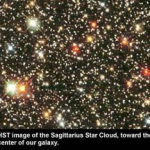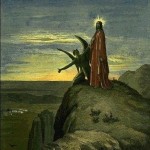Second Sunday of Lent – Cycle C
Reflecting on Genesis 15:5-12, 17-18
We’ve had so many beautiful, clear nights this winter that I’ve taken to stopping just before going in the door at home and looking up at the skies. The stars hang in the sky like diamonds, and it always shocks me a bit that this immense galaxy holds such beauty just above my little house.
Of course, my friends in Africa, and Israel, and Norway tonight will look on the very stars that light the doorway of my house. As musical composer Chris Tomlin wrote so gracefully, “God of wonder, beyond our galaxy, you are holy, holy.”
I like to imagine the stars in that desert sky when God told Abram to count them, if he could. Now, this is even more amazing when we consider that it was daylight when God issued this challenge! (We surmise this because later, in verse 17, it says, “When the sun had set and it was dark”. No wonder he couldn’t count them!)
Anyway, the current estimate is that there are three thousand million billion stars in our galaxy alone. That’s how many descendants Abram was to have. Well, if you count every Jew, Christian, and Muslim who has ever lived (and apparently no one ever has counted them, but I’ll keep googling), certainly they comprise the tiniest fraction of the number of stars. So, apparently the children of Abraham still have a long time to live on the earth. If my visits to the Muslim and Jewish quarters of the Old City of Jerusalem are any indication, Abraham’s descendants continue to multiply at a great rate.
It’s the beauty of the image of this great promise that catches my heart when I gaze upwards at night. Count the stars? Of course we can’t. But God, the Intelligent Designer, used the astounding stars to capture our imagination: all creation is in an eternal covenant with the merciful and awesome God of Wonder.
Do you like to star-gaze?
What would YOU like to say about this question, or today’s readings, or any of the columns from the past year? The sacred conversations are setting a Pentecost fire! Register here today and join the conversation.
I have come to light a fire on the earth; how I wish it were already burning (Lk.12:49).




